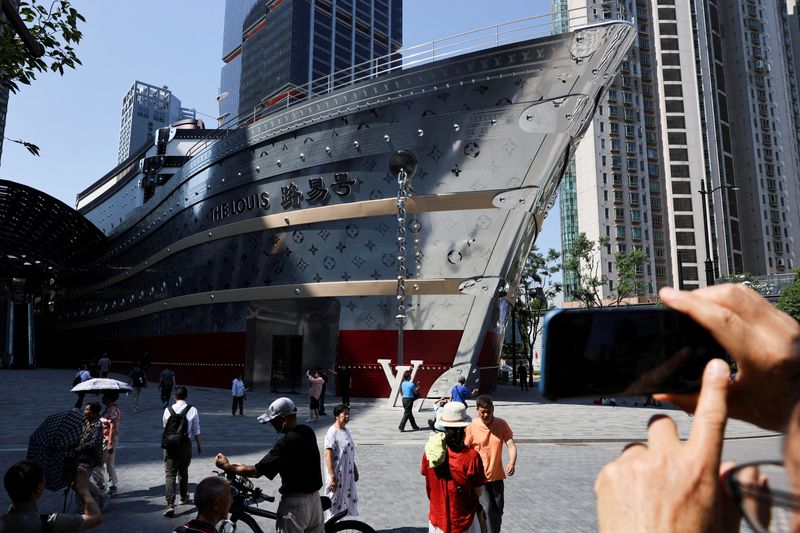By Casey Hall
SHANGHAI (Reuters) -Louis Vuitton’s latest Shanghai store is not your average luxury flagship. The 30-meter-high, ship-shaped store, “The Louis”, is billed as an experience, and houses an exhibition space and cafe in Shanghai’s downtown Nanjing Road shopping strip.
“The Louis”, which had a grand opening on Thursday, will undoubtedly draw crowds eager to post pictures to social media of its gleaming facade and the photo-ready exhibits inside. But LVMH-owned Louis Vuitton will also be hoping it can stimulate sales among Chinese consumers whose spending on luxury goods has slowed.
LVMH’s business strategy aligns with a broader shift among luxury goods retailers from a transactional model – where a shop merely sells goods to customers – to enticing customers with “experiences” that ultimately spur growth.
The stakes are high for the luxury brands, which for years have relied on brisk sales in China to fuel their global growth, and ambitions, but are now facing a slowdown in demand in the world’s second-biggest economy.
The size of the Chinese market declined more than 18% last year to around 350 billion yuan ($48.80 billion) and sales are on track for a flat performance in 2025, according to estimates from consultancy Bain.
Zino Helmlinger, head of China retail at real estate service provider CRBE, acknowledges that the luxury segment as a whole in China has taken “a hit” recently, though he believes the slowdown was expected.
“If you look at the megastars – I mean LVMH, Kering, Richemont, Hermès – they almost tripled their profit within five years,” he said. “At some point, there is some counterbalancing, there is only so much you can grow, only so much you can generate.”
In the first quarter, LVMH’s revenue in the region that includes China fell 11% on an organic basis – the Asia-Pacific excluding Japan accounts for 30% of the group’s total sales.
Chinese consumers, hard hit by broader economic uncertainty and a prolonged property market downturn, have tightened spending on discretionary purchases – luxury branded handbags among them.
Shanghai native Natalie Chen, 31, says she already owns enough “stuff” and has redirected a significant portion of the funds she once used for luxury goods to travel.
“Truthfully speaking, I don’t feel that buying another bag will improve my life,” she said, though she has already visited a new restaurant opened by Prada in Shanghai and intends to check out Louis Vuitton’s new cafe concept with girlfriends.
“It brings a different kind of feeling than just [shopping] in a mall,” Chen said, though she was unsure the ship-shaped store would lead her to make any purchases outside of coffee and cake.
Still, the luxury brands are sensing a longer term opportunity to pump-prime sales.
While appetite for personal luxury goods in China and around the world is declining, hurt by economic pressures and price fatigue, sales rates of “experiential goods” are rising, according to Bain, which highlighted a surge in personalized luxury hospitality experiences and rising fine dining sales in its spring luxury report.
In 2024, for example, the overall personal luxury goods market worldwide fell 1% to 3% even as experiential luxury spending rose 5%, Bain said.
LUXURY EVOLUTION
New research released by real estate advisor Savills earlier this month points to this as a significant new trend in what it describes as China’s “evolving” luxury market, in which people seeking out experiences are lured with more experiential luxury brand touchpoints, from restaurants to Salon Privé – private, appointment-only lounges for VIP shoppers.
“All the brands are closing stores, but those that can afford to are also opening big flagships or holding some big events or exhibitions to keep their visibility extremely high,” said Patrice Nordey, CEO of Shanghai-based innovation consultancy Trajectry, essentially preparing for future success when the market picks up again.
Brands from Balenciaga to Chanel, Louis Vuitton and Prada have all closed stores in China since the second-half of last year. Gucci is on track to close 10 stores in the market this year, Helmlinger said.
Louis Vuitton’s stablemate Dior opened a cafe concept in Chengdu earlier this year, and in March Prada opened a Wong Kar Wai-designed restaurant at its Rong Zhai cultural space in Shanghai. Jeweller Tiffany and Co. recently downsized a large downtown Shanghai store, but in March it also opened a new three-storey flagship in Chengdu.
Nordey says that while more people refer to this trend as “experiential” retail, it actually speaks to something much deeper.
“I think it’s a way of looking at your customer, either as someone that will buy products, or as an individual who is trying to have a more fulfilling life,” he said. “If your purpose is not only to feed your client with consumer products, but more than that, you might actually resonate more strongly with them.”
While high-profile luxury store closures in mainland China have prompted speculation of brands lessening investment in a slowing market, CRBE’s Helmlinger says the real story is more nuanced, indicating a strategic realignment of resources, rather than a pullback in the market.
“You need to create this concept of rarity, and rarity comes with scarcity,” he said. “When you have 80 or 90 stores in one market, it doesn’t seem so rare anymore, it seems like it’s mainstream.”
($1 = 7.1714 Chinese yuan renminbi)
(Reporting by Casey Hall in Shanghai; additional reporting by Mimosa SpencerEditing by Shri Navaratnam)


